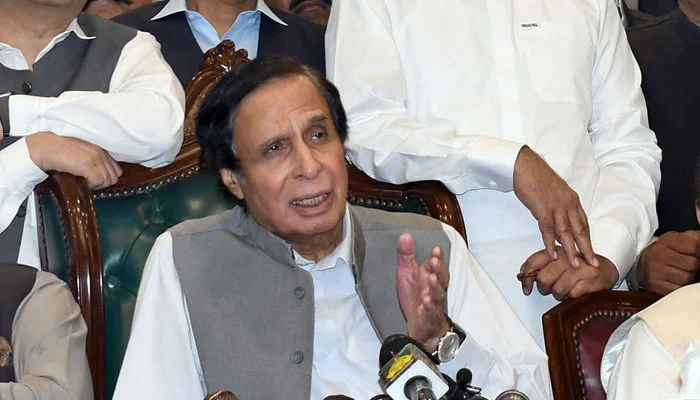- It was the speaker who did not summon a new session: Parvez Elahi
- CM can’t be held accountable for the speaker’s actions: Petition
- Punjab Governor denotified Elahi in the early hours of Friday
LAHORE: The Lahore High Court (LHC) will hear a petition filed by PML-Q leader Parvez Elahi challenging the denotification order of Punjab Governor Baligh Ur Rehman today.
A five-member bench headed by Justice Abid Aziz Sheikh has been formed by the LHC chief justice.
In the petition, Elahi has appealed to the court to declare the governor’s move denotifying him as chief minister.
It informs the court that the Punjab Assembly Speaker Sibtain Khan was asked to summon a session for vote of confidence. It added that the speaker did not summon the session as one was already underway.
“No action can be taken against any chief minister over speaker’s actions,” maintains the petition.
Governor Rehman has been made respondent in the case via his principal secretary and chief secretary of the province.
Elahi should take vote of confidence
Special Assistant to Prime Minister Attaullah Tarar advised Elahi that rather than approaching the court he should have taken the vote of confidence.
“He (Elahi) has no other option but to take a vote of confidence. Even the court cannot finish the vote of confidence. This has to be done legally as well,” tweeted Tarar following the submission of the petition.
The PTI and PML-Q had already announced their intention to approach court over the governor’s move.
Elahi, who has been denotified from his position as chief minister of Punjab by Governor Balighur Rehman, had rejected the notification and made up his mind to move the court.
“I reject the de-notification. I am the Chief Minister of Punjab and the cabinet will continue to function,” Chaudhry Parvez Elahi said while talking to the media in Friday’s early hours.
Meanwhile, PTI senior leader Fawad Chaudhry believes that the governor’s action holds “no legal status”.
Taking to Twitter, Fawad said Parvez Elahi and the provincial cabinet will continue to perform their duties, and a reference will be sent to the president for the governor’s dismissal from his office.
The tussle
Earlier this week, Governor Rehman had asked CM Elahi to take a vote of confidence from the Punjab Assembly.
The governor had asked Speaker Khan to summon a session on Wednesday at 4pm for Elahi to take a vote of confidence.
But defying the directives, Punjab Assembly speaker termed the order against the Constitution and adjourned an ongoing session till Friday.
The Pakistan Muslim League-Nawaz, which is in opposition in Punjab, had been stating that the failure to take the vote would force the governor to denotify Elahi as chief minister.
Consequently, Governor Rehman on Friday (today) issued the denotification order of Parvez Elahi as chief minister.
“Since CM has refrained from obtaining vote of confidence at the appointed day and time therefore he ceases to hold office. Orders issued this evening,” Rehman wrote on his Twitter handle, sharing a copy of the notification.
In the notification, the governor mentioned that despite an order issued for the CM to take a vote of confidence, he did not follow suit. Moreover, Elahi did not take the vote after 24 hours, the notification said.
“I am satisfied that he does not command the confidence of the majority of the members of the Punjab Assembly and therefore ceases to hold his office with immediate effect,” the notification stated.
The notification also mentioned that the provincial cabinet stands dissolved and the chief minister will continue performing his duties until a new person is elected to office.
Following the governor’s instruction, Chief Secretary of Punjab Abdullah Khan Sumbal also notified the dissolution of the provincial cabinet.


 Latest News2 days ago
Latest News2 days ago
 Business2 days ago
Business2 days ago
 Latest News2 days ago
Latest News2 days ago
 Latest News2 days ago
Latest News2 days ago
 Business2 days ago
Business2 days ago
 Latest News2 days ago
Latest News2 days ago
 Entertainment2 days ago
Entertainment2 days ago
 Latest News2 days ago
Latest News2 days ago























